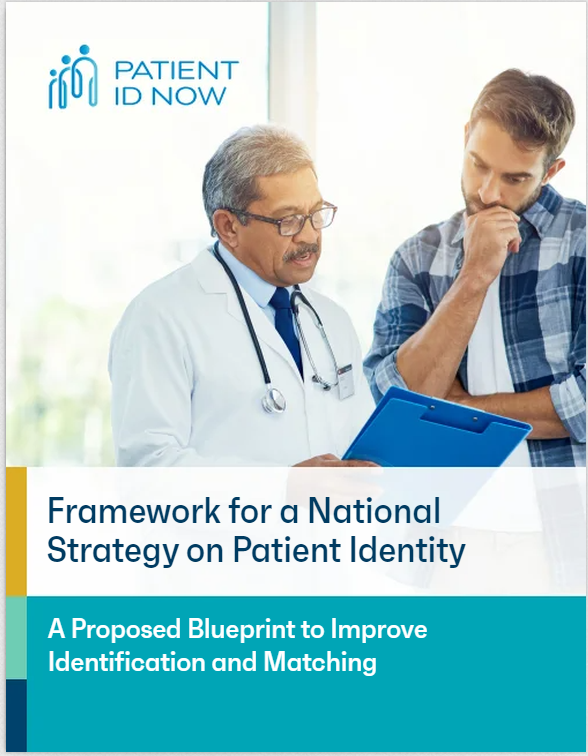RESOURCES
Patient ID Now Virtual Hill Briefing: Congress’ Role in Protecting Patients by Improving Patient ID
See the recent virtual Hill briefing from the Patient ID Now Coalition about why patient misidentification is a problem, and what Congress can do to address it.
Introduction: Cassie Ballard, Director of Congressional Affairs, CHIME
Moderator: Lauren Riplinger, Vice President, Policy & Government Affairs, AHIMA
Speakers:
Rachelle Boulton, Health Informatics Program Manager for the DPH Informatics Program, Utah Department of Health and Human Services
Dr. John Lee, CMIO, Allegheny Health Network
Rachel Podczervinski, MS, RHIA, Vice President, Professional Services, Just Associates
Karen Wilding, Vice President, Chief Value Officer, Nemours Children’s Health
Framework
See the Patient ID Now coalition’s newly released Framework for a National Strategy on Patient Identity, outlining considerations for a national strategy around patient identification and matching.
Headlines and Press Releases
- Bipartisan Representatives Reintroduce MATCH IT Act into the 119th Congress (Press Statement, March 2025)
- Bipartisan Representatives Introduce MATCH IT Act of 2024 (Press Statement, February 2024)
- 2022 Patient ID Week Media Alert (Press Statement, May 2022)
- Patient ID Now Coalition Disappointed Congress Continues to Include Rider to Stifle Progress on Patient Identification (Press Statement, March 2022)
- A National Unique Patient Identifier Faces an Uncertain, Bumpy Road (Health Data Management, November 2021)
- US Senate Removes Ban that Has Kept a National Patient ID from Progressing (Healthcare Innovation, October, 2021)
- Healthcare Groups Cheer Senate Progress on National Patient ID (Healthcare IT News, October, 2021)
- US Senate Removes Ban in Federal Budget that has Stifled Progress on a National Patient Identification Strategy for Two Decades (Press Statement, October 2021)
Patient ID Now Coalition Applauds House Action on Patient Misidentification for Third Year in a Row (Press Statement, July 2021)
- Patient ID Now Coalition Releases Framework for a National Strategy on Patient Identity (Press Statement, April 2021)
- 2021 Patient ID Day Press Statement (Press Statement, March 2021)
- Patient ID Now Press Statement on Senate FY21 Labor-HHS Appropriations Bill (Press Statement, November 2020)
- Working Together to Effectively Address Patient Identification During COVID-19 (Op-Ed, The Hill, October 2020)
- Patient ID Now Coalition Provides Written Testimony to Senate Hearing: Review of Coronavirus Response Efforts (Press Statement, September 2020)
Patient ID Now Coalition Delivers Observations at ONC Working Session (Press Statement, August 2020)
- Patient ID Now Coalition Pleased Congress is Addressing Patient Misidentification (Press Statement, July 2020)
- Pandemic is Perfect Time to Implement Patient ID Reform, Advocates Say (Inside Health Policy, July 2020)
- Groups Urge Congress to Take Action on Patient Identifier as COVID-19 Raises the Stakes (Fierce Healthcare, July 2020)
- Six Healthcare Organizations Form Coalition to Develop Nationwide Patient Identification Strategy (Healthcare Innovation, July 2020)
- Major Health Orgs Create National Patient Identifier Coalition (EHR Intelligence, July 2020)
- Intermountain, Health IT Groups form National Patient ID Coalition (Modern Healthcare, July 2020)
- The Senate can save lives by removing ban on unique patient identifier (AHIMA/CHIME Op-ed, The Hill, Sept. 2019)
Legislative Efforts
- Letters to the House Appropriations Committee and Senate Appropriations Committee Urging Repeal of Section 510 in the FY26 Labor-HHS appropriations bills (May 2025)
- Coalition Response to Cures 2.0 Request for Information (August 2024)
- Letters to the House Appropriations Committee and Senate Appropriations Committee from 154 organizations urging the repeal of Section 510 in the FY25 Labor-HHS appropriations bills. (April 2024)
- Letters to the House Appropriations Committee and Senate Appropriations Committee from 45 organizations requesting that $7 million of the funding appropriated to ONC in FY24 be used for patient matching efforts. (April 2023)
- Letters to the House Appropriations Committee and Senate Appropriations Committee Urging Repeal of Section 510 in the FY24 Labor-HHS Appropriations Bills (April 2023)
- Letters to the House Appropriations Committee and Senate Appropriations Committee Urging Repeal of Section 510 in final version of the FY23 Labor-HHS Appropriations Bills (November 2022)
- Letters to the House Appropriations Committee and Senate Appropriations Committee in Support of Repealing Section 510 in the FY23 Labor-HHS Appropriations Bills (May 2022)
- Testimony on Repeal of Section 510 from the Labor-HHS appropriations bill (May 2022)
- Comment letter on PREVENT Pandemics Act (February 2022)
- Comment letter on Cures 2.0 Draft Legislation (July 2021)
- Letters to the House Appropriations Committee and Senate Appropriations Committee in Support of Repealing Section 510 in the FY22 Labor-HHS Appropriations Bills
Events, Webinars, and Podcasts
Regulatory Efforts
- Comment Letter to OCR on HIPAA NPRM (May 2021)
- Comment Letter to ONC on Patient Matching (September 2020)
Coalition Member Resources
- The Ability to Accurately Identify and Match Patients to their Health Information is More Important Now than Ever During Public Health Crises (AHIMA, CHIME, and Intermountain–created resource)
- It’s Not Another Number: Technical Strategies to Accurately Match Patients with Their Data (AHIMA, CHIME, and Intermountain–created resource)
- Enunciated Views of the Department of Health and Human Services on a UPI (Intermountain-created resource)
- How a Unique Identifier will benefit patients while respecting information privacy (Intermountain-created resource)
- Removing the Appropriations Ban on a UPI—Responding to Concerns (Intermountain-created resourc
Studies/Reports
- Roundtable on Data sharing Policies, Data-Driven Solutions, and the Opioid Crisis (Center for Open Data Enterprise report)
- Roundtable on Data sharing Policies, Data-Driven Solutions, and the Opioid Crisis (Center for Open Data Enterprise report)
- GAO Report to Congressional Committees: Approaches and Challenges to Electronically Matching Patients’ Records across Providers (United States Government Accountability Office report)
- GAO Report to Congressional Committees: Approaches and Challenges to Electronically Matching Patients’ Records across Providers (United States Government Accountability Office report)

